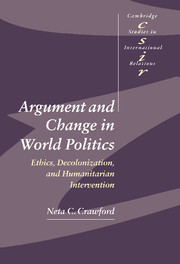Book contents
- Frontmatter
- Contents
- List of illustrations
- List of tables
- Acknowledgments
- Introduction
- 1 Argument, belief, and culture
- 2 Ethical argument and argument analysis
- 3 Colonial arguments
- 4 Decolonizing bodies: ending slavery and denormalizing forced labor
- 5 Faces of humanitarianism, rivers of blood
- 6 Sacred trust
- 7 Self-determination
- 8 Alternative explanations, counterfactuals, and causation
- 9 Poiesis and praxis: toward ethical world politics
- Appendix. African decolonization
- Select Bibliography
- Index
- CAMBRIDGE STUDIES IN INTERNATIONAL RELATIONS
3 - Colonial arguments
Published online by Cambridge University Press: 22 September 2009
- Frontmatter
- Contents
- List of illustrations
- List of tables
- Acknowledgments
- Introduction
- 1 Argument, belief, and culture
- 2 Ethical argument and argument analysis
- 3 Colonial arguments
- 4 Decolonizing bodies: ending slavery and denormalizing forced labor
- 5 Faces of humanitarianism, rivers of blood
- 6 Sacred trust
- 7 Self-determination
- 8 Alternative explanations, counterfactuals, and causation
- 9 Poiesis and praxis: toward ethical world politics
- Appendix. African decolonization
- Select Bibliography
- Index
- CAMBRIDGE STUDIES IN INTERNATIONAL RELATIONS
Summary
What we have to do is analyze specific rationalities rather than always invoking the progress of rationalization in general.
The sense of humanity was narrowly limited by race and religion. People of different blood and different faith were hardly considered human beings at all, and the highest moral requirements were satisfied by tendering them the blessings of Christianity and civilization.
Humanist values could be invoked and at the same time violated through the hierarchical classification of human beings that implied different standards of treatment for different kinds of subjects … the ethical prescriptions implied by Enlightenment values applied to some kinds of subjects but not to others.
For thousands of years, from ancient Persia, to Greece, Rome, China, and Aztec and Inca America, to the enormous colonial empires of Britain, Spain, and France in the nineteenth and twentieth centuries, colonialism was claimed by leaders of the metropole to be good for both the imperial power and the colonial holding. Colonialism – the political control, physical occupation, and domination by one group of people over another people and their land for purposes of extraction and settlement to benefit the occupiers – was considered a “normal” practice until the early twentieth century. In most cases, occupied land was distant from the center, or metropole, of the people from the occupying state and control was against the express wishes of the occupied people.
- Type
- Chapter
- Information
- Argument and Change in World PoliticsEthics, Decolonization, and Humanitarian Intervention, pp. 131 - 158Publisher: Cambridge University PressPrint publication year: 2002



